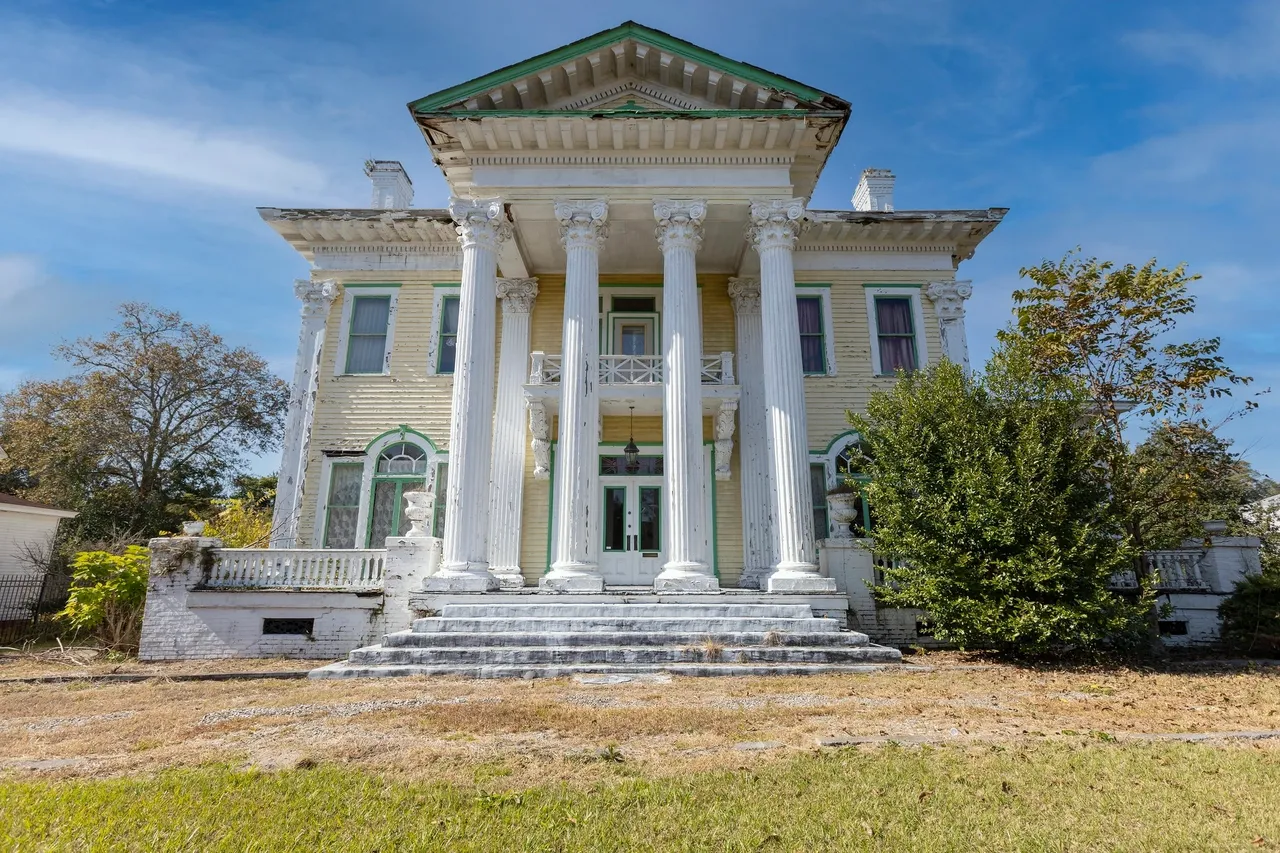In the late 1800s and early 1900s, Union Springs, Alabama, thrived with prosperity. Fueled by the convergence of two major railroads, this small town emerged as a vital hub not just for the state, but for the entire South. The economic upswing brought wealth to many residents, leading to the construction of numerous elegant Southern mansions across the area.
Throughout the Reconstruction era and beyond, Union Springs’ architectural landscape mirrored the varied tastes of its affluent denizens. Among these opulent residences stands the Rainer-Lewis House, a splendid twelve-room mansion whose construction began in 1902. Completed in 1904, this home showcases Neo-Classical Revival style, featuring a grand portico upheld by four majestic Corinthian columns, a picturesque second-floor balcony, and an exquisite stained-glass window adorning the interior staircase.


While Sterling Price Rainer, Jr. is often credited with the construction of the Rainer-Lewis House, some, including Bill Rainer, grandson of Rainer, Jr., suggest that the actual builder was likely Sterling Price Rainer, Sr.’s elder half-brother, William Walton Rainer.
Born on February 12, 1853, William Walton Rainer was the eldest son of Captain Joel H. Rainer, a prominent figure in Union Springs and Bullock County history. W. W. Rainer held the position of president at the Merchant and Farmers Bank of Union Springs for over two decades. Besides his banking pursuits, he was also one of the region’s most significant planters.
His involvement in politics was notable as well. Serving on the State Democratic Executive Committee and School Board, W. W. Rainer was a respected figure in both business and civic affairs. His passing on October 21, 1929, at the age of 77, following a significant surgery in a Montgomery hospital, marked the end of an era. At the time of his death, he was Union Springs’ most senior businessman, leaving behind a legacy of prosperity and community service.


Sterling Price Rainer, Sr., a prosperous merchant, held the esteemed position of Probate Judge in Bullock County. Before serving as Mayor, he spent four years on the city council. In 1907, he represented Bullock County as a State Legislator. Despite his achievements, he lived in a modest home just a few blocks away, a relic from the 1800s.
Sterling Price Rainer, Jr., born on January 24, 1885, and raised in Union Springs, pursued higher education at the University of Alabama. In 1908, he entered the business world by establishing Dixie Warehouse, specializing in cotton. Following his father’s footsteps, he later took on the roles of Probate Judge and Mayor of Union Springs. His marriage to Jean Lacoste Evans in 1909 marked the beginning of a family, which eventually grew to include three children by 1918. Rainer, Jr. remained deeply connected to Union Springs until his passing on May 29, 1967, at 82. His lifelong dedication to Union Springs Presbyterian Church earned him a 42-year tenure as a deacon. The Rainer family’s final resting place is in Oak Hill Cemetery.
From 1994 to 2009, the residence changed hands to Dr. Joice C. and Albert Lewis. Dr. Joice C. Bailey-Lewis, the former Superintendent of Bullock County Schools, received recognition from Governor Fob James in the 1990s for her exceptional contributions to education in Macon County. Her expertise led to her appointment as State Chief Financial Officer, tasked with stabilizing the finances of the Macon County School System during a period of insolvency, successfully completing her mission in 1997.


In 2012, the Rainer-Lewis House found a new owner in Dr. Marcy Hikes-McDonald, who came across the listing online. After many years with the Veterans Administration, Dr. Hikes-McDonald decided to retire and settle down in Union Springs. Eager to restore the grandeur of the historic home, she invested time and effort into its renovation, with the assistance of her brother, Robert Hikes, who had retired from Honeywell Corporation in Massachusetts.
However, by 2015, both Marcy and Robert made the decision to relocate to Georgia to be closer to family. Unfortunately, due to either age-related issues or illness, the property became exempt from property taxes and was left abandoned. In February 2022, there was a flurry of activity around the house, with workers seen and lift trucks parked out front. Many speculated whether a renovation was underway, but it turned out that the equipment was being used for the restoration of a neighboring property.
Nevertheless, news emerged over the summer that the Rainer-Lewis House had been purchased by a contractor with plans to restore the property and make it their new home.























Photography By: Leland Kent of Abandoned Southeast

